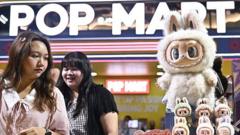Pop Mart, the Beijing-based toy firm synonymous with the wildly popular Labubu dolls, has announced an astonishing profit increase forecast of at least 350% for the first half of this year, alongside revenue more than tripling. With a market valuation exceeding $40 billion (£31.6 billion), the company's financial uplift has been attributed to heightened brand recognition worldwide and robust cost control measures.
Labubu dolls, characterized as fictional elf-like beings with distinct jagged teeth, have become a global sensation, leading to long queues and fervent demand at retail locations around the globe. Best known for its "blind boxes," a unique packaging approach that conceals the contents, Pop Mart has faced scrutiny over promoting highly addictive shopping behaviors. Launched in 2019, the Labubu line has rapidly allowed the company to emerge as a formidable retail player, running over 2,000 vending machines and stores internationally.
Since its initial public offering on the Hong Kong Stock Exchange in 2020, the company's stock has soared nearly 600% in the last year. Notably, sales outside of mainland China accounted for almost 40% of Pop Mart's total revenue in 2024. The demand for Labubu dolls has been so overwhelming that many retailers globally temporarily halted sales to keep up with consumer interest.
The doll's surge in the US market has been magnified by celebrity endorsements from personalities such as Kim Kardashian and Lisa from the K-pop sensation Blackpink. According to data from equity research firm M Science, Labubu sales in the US jumped an extraordinary 5,000% year-on-year in June alone. Analyst Vinci Zhang noted that this level of growth is quite unparalleled in the toy industry.
Despite operating nearly 400 stores in China, Pop Mart has significant growth potential in the US, where it currently manages just under 40 stores. The unprecedented demand for Labubu dolls has resulted in a thriving resale market, where prices have soared from the initial $10 retail value to hundreds of dollars for rare pieces. This included a human-sized Labubu doll fetching $150,000 at a recent auction in Beijing.
However, Labubu’s success has also led to a proliferation of counterfeit products, dubbed Lafufu dolls. In June, Chinese authorities undertook measures to combat this counterfeit market, seizing over 46,000 fake Labubu toys. As Pop Mart continues its rise, the brand's journey has stirred vibrant discussions about its unique position in the intersection of cultural phenomenon and reselling marketplaces.






















